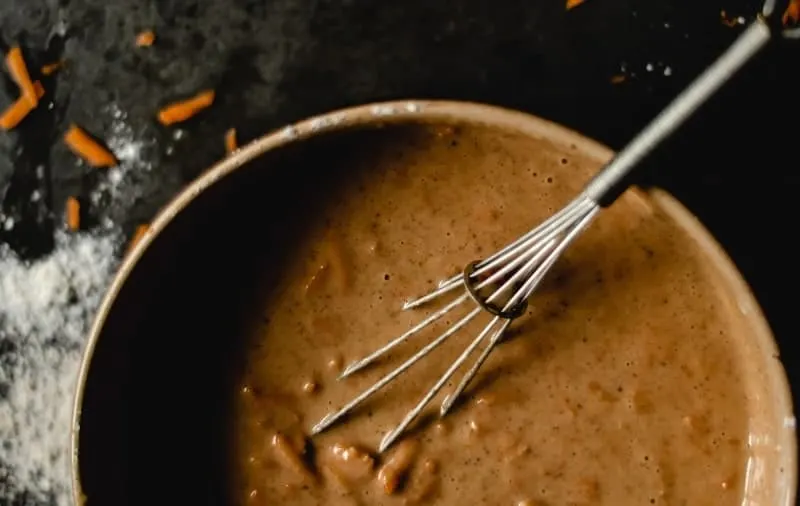It requires a lot of time and dedication before your cakes start coming out perfectly. You need to put in plenty of practice and go through trial and error before you can expect to be baking successful cakes consistently.
There are many variables that go into making a good cake, so even the smallest mistake can have a strong enough effect that causes problems with your cake.
You might have heard that cake needs to be baked immediately after mixing, but is this true or can you get away with waiting before baking it?
Most cake batter doesn’t need to be baked immediately. Although you’ll get the best results by baking it straight after mixing the wet and dry ingredients, a lot of cake batter can sit in the fridge for anywhere from 1-24 hours and still rise during baking.
You’ll get the best results from cake batter that’s baked immediately since the chemical leavener(s) is still active and able to raise the cake in the oven effectively.
Baking powder, which is generally used in cake, is almost always double-acting, which means that reacts twice to create gas that rises the cake batter.
The first reaction occurs when the baking powder is mixed with a liquid and the second occurs when it’s heated.
Due to this first reaction happening as soon as the baking powder comes into contact with a liquid, you only have a limited amount of time before this initial reaction is exhausted.
However, even when this initial reaction is done, the cake can still rise during baking due to the second reaction. This still leads to a cake that rises, but it won’t be able to rise as much.
What Happens When Cake Batter Isn’t Baked Immediately?
It’s not going to be the end of the world if the cake batter isn’t baked immediately, but your cake might not have much rising potential if you leave it for too long.
Of course, the amount of rising the cake gets is largely determined by the type of cake you’re making, but for ease, I’ll generalize what happens when the batter sits for a while before being baked.
There are two main negative effects that can occur when a cake isn’t baked immediately:
- Any Air Beaten Into The Mixture Can Be Lost
- The Baking Powder Will Be Less Effective
- A lot of cake batter has plenty of air beaten into it so it produces a lighter texture and a tall rise. Air can be added into the batter whilst beating the butter and sugar, or by beating the eggs and folding them into the batter.
If the cake batter is allowed to sit for a while, this air can start to slowly escape. If it sits for too long, this air can escape completely, which can lead to a much flatter cake. - Since baking powder reacts twice (when coming in contact with water and also when heated), the first reaction will be wasted since it’s not baked right away.
Since the initial reaction is completed before baking, there can only be a limited amount of rising in the oven. Fortunately, this second reaction can still rise the batter somewhat effectively. It’s likely that the cake won’t rise as much as it could if it were to be baked immediately, but this depends on how much baking powder was used.
Hypothetically, the more baking powder you use in the cake, the more it will rise even without the first reaction, but I don’t recommend adding too much more baking powder as it can ruin the flavor of the cake.
Although these two effects are definitely problems, you can still get a rise out of your cake when baking even if it has been sat for a while.
It’s never the end of the world if you can’t bake it immediately. In the majority of cakes, there will be little to no problems with the rise after the cake has been sitting around for a bit longer than you’d like.
If in doubt about when to bake your cake, just put it in the fridge, covered, and bake it whenever is convenient. Sooner rather than later is better, of course.
How Long Can Cake Batter Last Before Baking?
Generally speaking, the longer a cake batter is left to sit before baking, the less it’s going to be able to rise when baked. This is just because the effectiveness of the chemical leavener will lessen and the air in the batter with escape over time.
Another thing to consider is that cake batter can go bad if left out for too long. Since it often contains milk and eggs, which can go bad very quickly at room temperature, the batter is susceptible to a lot of bacteria growth. Leaving the batter out for any more than a couple of hours could allow it to develop some unwanted and unsafe bacteria.
For this reason, cake batter should be put into the fridge if you’re not going to bake it right away.
The length of time that your cake batter is able to last depends on what type of cake you’re making. There are so many variables and different kinds of cakes that it’s impossible to give an exact length of time that it can last for, but here’s a rough guideline.
If you can’t bake your cake batter right away, it can be stored in the fridge for anywhere from 1-24 hours. Most cakes will last longer without spoiling, but they will lose their rising potential, so they will be much more flat. The batter should be frozen in a freezer-safe bag if stored for any longer.
For most people, it will come down to trial and error before figuring out how long a specific cake batter can last. There are so many variables, like the type of cake being made, the amount of chemical leavener being used, and the strength of the chemical leavener.
Quick Tip: Instead of storing your batter in the refrigerator for too long, bake the batter and freeze the cake slices until they’re ready to use. When you need them, you should take the cake out of the freezer a few hours before (or longer if it’s thick) and let it defrost before decorating it.
Whether you choose to bake the cake right away or store the batter for later, there are bound to be mistakes made along the way. If any failures are made, be sure to learn from them and understand what you can do next time for even better results.

